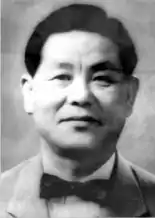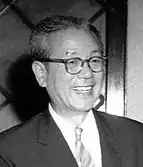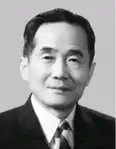1956 South Korean presidential election
Presidential and vice-presidential elections were held in South Korea on 15 May 1956.[1] The result was a victory for Syngman Rhee, who won 70.0% of the vote. Voter turnout was 94.4%.[2]

Election posters for Rhee's Liberal party
| ||||||||||||||||
|
| ||||||||||||||||
Presidential election | ||||||||||||||||
| ||||||||||||||||
| ||||||||||||||||
Vice-Presidential election | ||||||||||||||||
| ||||||||||||||||
| ||||||||||||||||
Rhee, who at that time held a virtual monopoly on political power, was opposed by Shin Ik-hee and Cho Bong-am. Shin died before the election by disease, and Cho campaigned on a platform of peaceful reunification in opposition to Rhee's policy of "March North and unify Korea".[3] Cho exceeded expectations by receiving over 30% of the vote. Three years later, Cho was accused of violating the National Security Law and executed.[4]
Results
President
| Candidate | Party | Votes | % | |
|---|---|---|---|---|
| Syngman Rhee | Liberal Party | 5,046,437 | 69.99 | |
| Cho Bong-am | Independent | 2,163,808 | 30.01 | |
| Total | 7,210,245 | 100.00 | ||
| Valid votes | 7,210,245 | 79.52 | ||
| Invalid/blank votes | 1,856,818 | 20.48 | ||
| Total votes | 9,067,063 | 100.00 | ||
| Registered voters/turnout | 9,606,870 | 94.38 | ||
| Source: Nohlen et al. | ||||
By region
| Region | Syngman Rhee | Cho Bong-am | ||
|---|---|---|---|---|
| Votes | % | Votes | % | |
| Seoul | 205,253 | 63.3 | 25,631 | 36.7 |
| Gyeonggi | 607,757 | 77.1 | 44,967 | 22.9 |
| Gangwon | 644,693 | 90.8 | 10,516 | 9.2 |
| North Chungcheong | 353,201 | 86.1 | 25,875 | 13.9 |
| South Chungcheong | 530,531 | 77.1 | 56,590 | 22.9 |
| North Jeolla | 424,674 | 60.2 | 109,490 | 39.8 |
| South Jeolla | 741,623 | 72.1 | 99,885 | 27.9 |
| North Gyeongsang | 621,530 | 55.3 | 129,791 | 44.7 |
| South Gyeongsang | 830,492 | 62.3 | 288,654 | 37.7 |
| Jeju | 86,683 | 87.9 | 6,105 | 12.1 |
| Total | 5,046,437 | 70.0 | 797,504 | 30.0 |
| Source: National Election Commission[5] | ||||
Vice-President
| Candidate | Party | Votes | % | |
|---|---|---|---|---|
| Chang Myon | Democratic Party | 4,012,654 | 46.43 | |
| Lee Ki-poong | Liberal Party | 3,805,502 | 44.03 | |
| Lee Beom-seok | Independent | 317,579 | 3.67 | |
| Yun Chi-young | Korea Nationalist Party | 241,278 | 2.79 | |
| Paeg Song-uk | Independent | 230,555 | 2.67 | |
| Yi Yun-yong | Choseon Democratic Party | 34,926 | 0.40 | |
| Total | 8,642,494 | 100.00 | ||
| Valid votes | 8,642,494 | 95.35 | ||
| Invalid/blank votes | 421,700 | 4.65 | ||
| Total votes | 9,064,194 | 100.00 | ||
| Registered voters/turnout | 9,606,870 | 94.35 | ||
By region
| Region | Chang Myon | Lee Ki-poong | Lee Beom-seok | Yun Chi-young | Paeg Song-uk | Yi Yun-yong | ||||||
|---|---|---|---|---|---|---|---|---|---|---|---|---|
| Votes | % | Votes | % | Votes | % | Votes | % | Votes | % | Votes | % | |
| Seoul | 451,037 | 76.9 | 95,454 | 16.3 | 21,530 | 3.7 | 12,445 | 2.1 | 3,802 | 0.6 | 2,285 | 0.4 |
| Gyeonggi | 450,140 | 44.9 | 424,104 | 42.3 | 55,621 | 5.5 | 40,720 | 4.1 | 25,216 | 2.5 | 6,768 | 0.7 |
| Gangwon | 103,493 | 13.6 | 611,704 | 80.2 | 23,612 | 3.1 | 14,046 | 1.8 | 7,052 | 0.9 | 3,225 | 0.4 |
| North Chungcheong | 159,310 | 33.7 | 245,218 | 51.8 | 28,264 | 6.0 | 14,411 | 3.0 | 24,727 | 5.2 | 1,347 | 0.3 |
| South Chungcheong | 374,209 | 43.7 | 364,750 | 42.6 | 51,589 | 6.0 | 29,054 | 3.4 | 31,895 | 3.7 | 4,675 | 0.5 |
| North Jeolla | 428,410 | 51.0 | 338,283 | 40.3 | 28,954 | 3.4 | 25,430 | 3.0 | 15,596 | 1.9 | 2,738 | 0.3 |
| South Jeolla | 529,341 | 43.7 | 549,279 | 45.3 | 33,890 | 2.8 | 25,979 | 2.1 | 70,628 | 5.8 | 3,294 | 0.3 |
| North Gyeongsang | 715,342 | 54.4 | 475,754 | 36.1 | 41,037 | 3.1 | 38,188 | 2.9 | 40,544 | 3.1 | 5,303 | 0.4 |
| South Gyeongsang | 778,903 | 52.5 | 623,409 | 42.0 | 30,264 | 2.0 | 38,288 | 2.6 | 7,899 | 0.5 | 4,575 | 0.3 |
| Jeju | 22,469 | 19.9 | 77,547 | 68.6 | 7,818 | 6.9 | 2,717 | 2.4 | 2,196 | 1.9 | 216 | 0.2 |
| Total | 4,012,654 | 46.4 | 3,805,502 | 44.0 | 317,579 | 3.7 | 241,278 | 2.8 | 230,555 | 2.7 | 34,926 | 0.4 |
References
- Dieter Nohlen, Florian Grotz & Christof Hartmann (2001) Elections in Asia: A data handbook, Volume II, p420 ISBN 0-19-924959-8
- Nohlen et al., p464
- Kim, H-A (2004). Korea's development under Park Chung Hee. RoutledgeCurzon, pp. 42–43.
- Kim, p. 42.
- "개표현황". National Election Commission. Archived from the original on 2017-07-10. Retrieved 14 April 2021.
This article is issued from Wikipedia. The text is licensed under Creative Commons - Attribution - Sharealike. Additional terms may apply for the media files.



